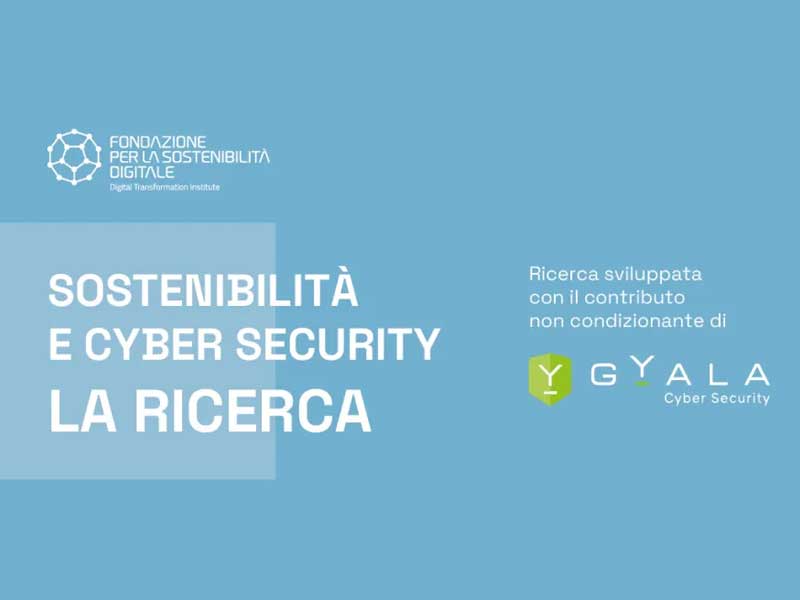Cyber Security and Sustainability, Research

Research project developed by ” Fondazione per la Sostenibilità Digitale ” with the non-conditional support of Gyala
Cybersecurity and sustainability are complementary to the development of a better society, according to a study developed by ” Fondazione per la Sostenibilità Digitale ” with the non-conditional support of Gyala.
The report explores the intersections between digital security and sustainability, setting clear priorities, with the aim of proposing a framework that leads to a cybersecurity that is both sustainable and driving sustainability, outlining the convergence between cybersecurity and sustainability, which should not be interpreted as separate entities, but complementary, both moving towards the development of a better society. The project is the result of an in-depth analysis carried out through focus groups consisting of a variety of experts—including CIOs, CISOs, university lecturers and researchers – with a rich professional background in the industry.
Technology areas impacting more than half of SDGs
Three priority technological areas have emerged, impacting more than half of the SDGs, namely the United Nations Sustainable Development Goals: IT/OT technology integration, digital privacy, sovereignty.
IT/OT technology integration
With the development of IoT (Internet of Things) technologies, it is becoming increasingly important to integrate digital IT components and physical OT components. This can have a significant impact on various SDGs and, in terms of sustainability, specific security features too.The survey of the CIO sample shows that, with regard to IT/OT integration, the greatest impacts are felt in the area of Environmental Sustainability. In second place is Economic Sustainability and in third place is Social Sustainability.
The CIOs interviewed are aware that IT/OT integration is crucial for supporting processes related to safeguarding and protecting the environment, including in relation to the resilience of critical infrastructures and their economic value.
Privacy
Cyber security and Privacy often run the risk of being seen as elements opposed to one another. That said, it is vitally important when it comes to sustainability, to emphasise that cyber security must be pursued while respecting users’ privacy and that, at the same time, security is an important tool for sustainability.For the respondents, social sustainability is the area primarily impacted by privacy; This is followed by economic and environmental sustainability. The correlation between privacy and security encompasses all topics of the survey. The measure on which there is most agreement (62%) in the feedback pertains to SDG3: a patient’s safety must be managed while respecting their privacy.
Digital Sovereignty
With respect to the way in which a state regulates and exercises the governance of the technology and services used in various ways within its national borders (digital sovereignty), cyber security is seen as a highly critical element and, at the same time, a central issue in terms of sustainability.
The respondents make it clear that digital sovereignty is vital in security to ensure economic sustainability, as well as social sustainability. With regard to digital sovereignty, environmental sustainability is seen as the least relevant area.
Foundation for Digital Sustainability
The Foundation for Digital Sustainability is the first recognised research foundation in Italy dedicated to investigating issues related to digital sustainability. It consists of independent experts, institutions, companies and universities whose representatives serve on steering and scientific committees.
Their goal is to achieve statutory objectives by establishing the Foundation’s programme of activities and providing the resources necessary for them to be carried out.
The Foundation works in two ways:
- contributing to the identification of ways in which digital transformation can be useful in achieving the sustainability goals defined in the Agenda 2030,thereby making technology a tool for sustainability.
- contributing to the development of a structured review on how digitisation should itself be implemented based on sustainability principles, including in relation to the role of platforms and related economic and social phenomena, thereby making technology a tool for sustainability.